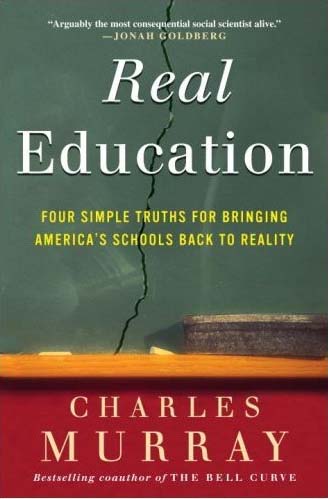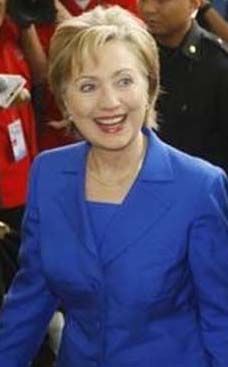
In Real Education (2008), Murray wielded his pen against the public school system and its assumption that all children can achieve some set level of minimum competency. Through that flawed premise, he writes, our schools alienate children with below-average academic ability--and leave the brightest bored and unchallenged. Thus, neither set of students is realizing its full potential--or greatest happiness. Furthermore, by setting a goal for universal college enrollment (as President Barack Obama has done), we are devaluing liberal education and harming society by limiting the options of young people who are better suited by temperament, ability, or interest to other endeavors. Instead, Murray proposed matching students' abilities with their educational needs and emphasizing higher education primarily for excellent students best suited to its special demands. Charles Murray served as a Peace Corps Volunteer in Thailand in the 1960's.
Charles Murray will receive the American Enterprise Institute's highest honor, the Irving Kristol Award
Charles Murray in Pursuit of Happiness
Print Mail
AEI in an Instant
Posted: Thursday, March 5, 2009
ARTICLES
AEI in an Instant
Publication Date: March 6, 2009
W. H. Brady Scholar Charles Murray
W. H. Brady Scholar
Charles Murray
Charles Murray will receive the American Enterprise Institute's highest honor, the Irving Kristol Award, on March 11. His lecture, "The Happiness of the People," takes its title from James Madison's phrase for the proper object of government. At the same time, it expands on a theme central to his own life and work. Murray's 1988 book In Pursuit: Of Happiness and Good Government defines happiness as the "lasting and justified satisfaction with one's life as a whole." His own quest for satisfaction has taken Murray from the picket fences of his Iowa hometown to the hamlets of rural Thailand as a Peace Corps volunteer, from field research in poor urban communities to his current position as one of America's best-known and most controversial social scientists. But for those who look to Murray's career and see only attempts to be divisive, the avowed libertarian is quick to point out that his work aims to enable people to pursue happiness, which he describes in Pursuit as the very "duty of a human being functioning as a human being."
The book that established Murray as a household name in public policy and laid the groundwork for the welfare reform of the 1990s, Losing Ground (1984), discussed America's cultural devolution into a welfare state and questioned the measurement of "net happiness" afforded by redistributive social policy. Murray concluded that--even worse than their financial cost--coercive wealth transfers rob those whom they are most designed to benefit of their inalienable right to the pursuit of happiness by fraudulently claiming to guarantee its achievement. This claim, Murray has noted, is "not within the gift of any government."
In 2006 Murray returned to welfare--although he never really left the subject of happiness--with In Our Hands: A Plan to Replace the Welfare State. His plan--to replace all subsidies and transfer programs with an annual cash grant for every American adult--is designed to equip people to live satisfying and happy lives through expanded vocational opportunities, renewed vitality of marriage, and a strengthened civil society.
Murray's seminal book The Bell Curve has sparked heated debate since it appeared in 1994, even as much of the science Murray and coauthor Richard J. Herrnstein relied upon has become widely accepted. The controversy about the relationship between genetics, intelligence, and happiness is unlikely to abate as American politics grows ever more fixated on redistributive social justice, an increasingly difficult prospect in a largely intelligence- and information-based economy. In the constant search for "lasting and justified satisfaction with one's life," Murray writes, responsible and independent mental prowess is more necessary and valuable than ever.
In Real Education (2008), Murray wielded his pen against the public school system and its assumption that all children can achieve some set level of minimum competency. Through that flawed premise, he writes, our schools alienate children with below-average academic ability--and leave the brightest bored and unchallenged. Thus, neither set of students is realizing its full potential--or greatest happiness. Furthermore, by setting a goal for universal college enrollment (as President Barack Obama has done), we are devaluing liberal education and harming society by limiting the options of young people who are better suited by temperament, ability, or interest to other endeavors. Instead, Murray proposed matching students' abilities with their educational needs and emphasizing higher education primarily for excellent students best suited to its special demands.
Indeed, in the past decade, Murray has examined the connection of excellence to happiness. "Human beings enjoy the exercise of their realized capacities, with the enjoyment increasing the more the capacity is realized," Murray writes. "Those with the capacity for excellence do not need to be cajoled into wanting to realize it. The pursuit of excellence is as natural as the pursuit of happiness."
The intellectual outliers who populate the upper end of the bell curve are the subject of Human Accomplishment (2003). That book is Murray's ambitious survey--and ranking--of the greatest human achievements in philosophy, art, science, and invention. In it, he found that throughout history the highest human flourishing has tended to occur in cultures and societies that seriously contemplate the place of mankind in the cosmos and believe that their words and deeds have "some transcendental significance." Those cultures found happiness and the deepest satisfaction in life. Meanwhile, they achieved great things at the outermost limits of human capability.
Happiness: doing one's best with one's own capacities. Murray's humane vision has centered on the happiness of the people, from members of the underclass to men of genius. Perhaps more significantly, he has shown us that human thriving and happiness are vital concerns for public policy and those who make it.












